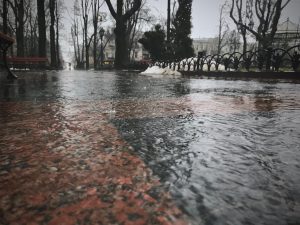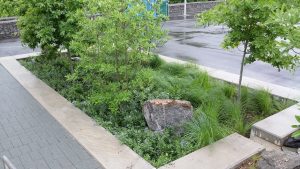While the Evaluation of Alternatives reports are not final plans, they provide a first look at the possible solutions and a breakdown of which ones are likely to be the most feasible. NJDEP recognizes the importance of public input in this process and is soliciting feedback from community members as part of their review of the reports and have required permittees to educate and engage the public in the selection of alternatives. Comments can be submitted until September 1, 2019.
“These reports show that local communities are very concerned about sewage overflows into nearby streets and waterways and that they expect green solutions to be incorporated into the next phase of planning because while reducing sewage flows it also provides open space, improved air quality and heat island temperature reductions that aren’t realized with traditional infrastructure,” said Greg Remaud, NY/NJ Baykeeper. “As of July 1, 2019, communities have less than a year until the final plans, known as Long Term Control Plans (LTCPs), are due,” said Nicole Miller of NewarkDIG (Doing Infrastructure Green). “Once the final plans are approved by the NJDEP they will take decades to complete and cost millions of dollars to implement. With proper community input, LTCPs have the potential to provide benefits. Now is the time for the community members to make their voices heard by submitting comments to NJDEP and participating in local and regional stakeholder meetings. The next few months are critical for the residents and business owners who will be impacted by these plans and who will ultimately pay for them.”
“These alternatives plans are a critical step in gathering local knowledge from communities suffering from polluted stormwater and sewage flooding. The people who live in these communities understand these problems and their effects the best. Projects in these alternatives plans, specifically, green infrastructure, will reduce flooding and sewage overflow, and will improve the environment of the community, the health of its citizens, and property values,” said Jennifer M. Coffey, ANJEC Executive Director.
For more information on participating in stakeholder meetings and other ways to get involved go to SewageFreeNJ.org.The Evaluation of Alternatives reports are the result of permits issued by NJDEP in 2015 to 25 municipalities and utilities in New Jersey with combined sewer systems requiring them to develop plans to reduce the number and severity of combined sewer overflows. These overflows happen when stormwater overwhelms the system. This combination of stormwater and sewage is released into nearby waterways, and sometimes floods area streets and backs up into basements.

All of the Development and Evaluation of Alternative reports can be downloaded from the NJDEP website.
Armando Alfonso Armando.Alfonso@dep.nj.gov (609) 633-7021 for comments on the Camden County Municipal Utility Authority, The City of Camden, The City of Gloucester, Trenton Sewer Authority reports.Comments can be sent to the respective DEP team leader.
Nancy Kempel, Nancy.Kempel@dep.nj.gov 609-292-4860 for comments on the Bergen County Utilities Authority, Fort Lee Boro, Hackensack City, Ridgefield Park Village, The Joint Meeting of Essex and Union Counties, The City of Elizabeth reports.
Joe Mannick, Joe.Mannick@dep.nj.gov, 609-292-4860 for comments on North Hudson Sewerage Authority, North Bergen Woodcliff Sewer Treatment Plant, Town of Guttenberg reports.
Dwayne Kobesky, Dwayne.Kobesky@dep.nj.gov 609-292-4860 for comments on the Perth Amboy, Middlesex County Utilities Authority, Passaic Valley Sewerage Commission, Bayonne, Jersey City Municipal Utilities Authority, Newark, North Bergen Township Municipal Utilities Authority, East Newark, Harrison, Kearny, Paterson reports.
Local perspectives from Sewage-Free Streets and Rivers campaign partners:
Jersey City:
“This is an important first step to assess the optimal set of solutions for managing the impact of stormwater from future storm events in Jersey City and our surrounding waterways. Sustainable Jersey City supports a combination of both grey and green infrastructure (GI) and feel strongly about leveraging GI opportunities FIRST, to both save on the enormous cost of grey infrastructure and also to gain the varied additional quality of life benefits GI can provide. We are particularly interested in the expansion of urban forestry initiatives in Jersey City as we can solve multiple problems and provide a healthier environment for people simply by substantially growing our tree canopy. We will do our part to educate and engage the public over this next year, encouraging community feedback about possible solutions during this next decision making phase by the Jersey City Municipal Utilities Authority.”
Debra A. Italiano, Founder & Chair, SustainableJC.org
“I was so pleased that our Board of Commissioners recently passed a resolution to evaluate the creation of a Green Infrastructure Incentive program. The study will evaluate the use of various green infrastructure incentives to help reduce combined sewer overflows (CSOs), enhance drainage in certain neighborhoods, improve the tree canopy, and access to green space. Offering incentives like storm water fee reduction credits to developers for using green roofs or pervious pavement, has been shown to work in several other communities and we think it may work here as well.”
Tom Gibbons, Commissioner, JCMUA/Hamilton Neighborhood Association
Bayonne:
“With the recent increase in building development and the loss of many of the mature street trees, Bayonne is at a turning point, as the planet is at a tipping point, environmentally. We need to affirm a plan that will not only improve green and open space while protecting our waters, but maintain what we have. The report does not include the location of projects. I am concerned that people can not have informed input without knowing where they will be placed and worried that some of the proposed projects could actually destroy our green spaces. This will only be mitigated by robust public input. This is the challenge for individuals and community groups. What is at stake in this decision is a livable future and a government that is responsive and accountable to its residents, where decisions this far reaching are made by, and for the benefit of all.”
Jill Scipione, President, Morris Park Neighborhood Association
Perth Amboy:
“The alternative reports recently submitted by the 21 NJ cities forces residents and public officials, on all levels, to think about effective solutions that will fix this serious problem we’re faced with combined sewage overflows. We can no longer sweep this issue under the rug and hope that someone else will come and solve it. The surging of waste in our waterways has been detrimental to our ecosystem, local sea creatures, and even the water quality within our homes. We must all play a role in being a part of the solution by limiting the use of water in our homes, implementing green infrastructures that captures rainfall, and finding ways that fund grey infrastructure improvements, which will cost millions, if not, billions of dollars per city. I’m hoping that we can create a culture shift that steps up to this challenge before it impacts our property taxes.”
Joel Rosa, Perth Amboy Civic Trust
 “Communities will be investing billions of dollars to stop sewage from overflowing into waterways and backing up onto streets and into basements,” said Kim Gaddy, Newark resident and Environmental Justice Organizer for Clean Water Action. “The question is what will this investment look like and how will it benefit our communities?”
“Communities will be investing billions of dollars to stop sewage from overflowing into waterways and backing up onto streets and into basements,” said Kim Gaddy, Newark resident and Environmental Justice Organizer for Clean Water Action. “The question is what will this investment look like and how will it benefit our communities?”